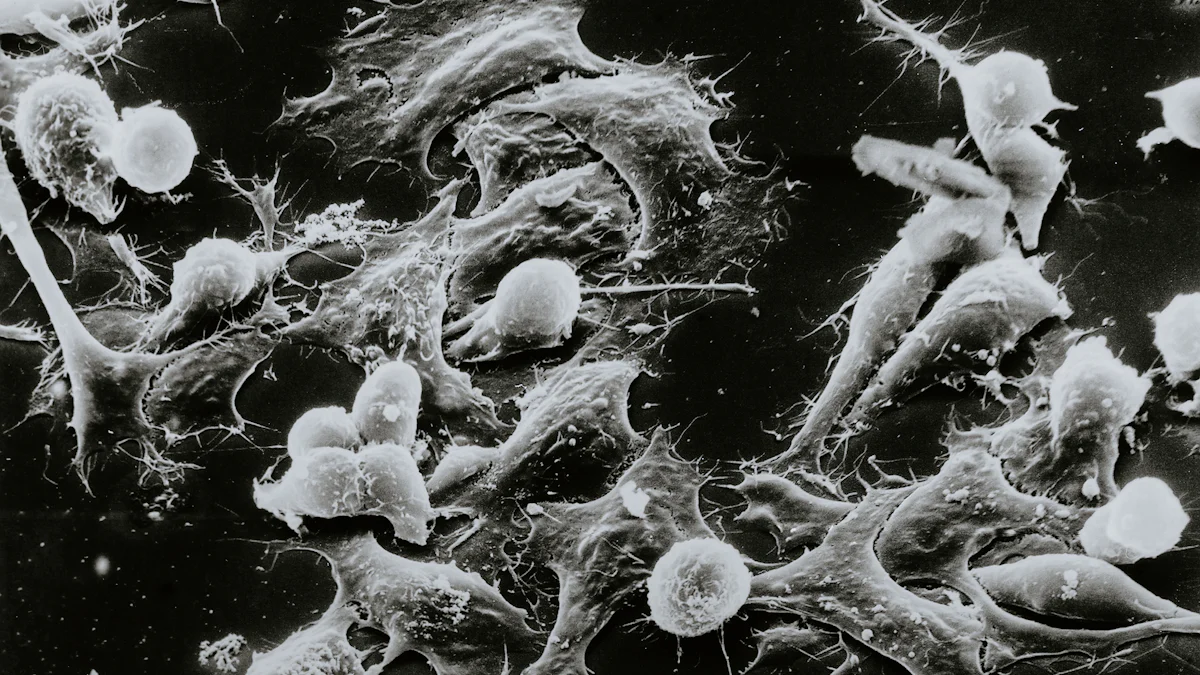
Cellular Activators play a pivotal role in nurturing skin cells and enhancing skin health. Skin, being the body's largest organ, serves as a crucial barrier against external threats, emphasizing the significance of maintaining its vitality. This blog delves into the intricate world of Cellular Activators in skin cells and skincare, shedding light on their diverse impacts and mechanisms. By exploring various types of activators and their effects on skin health, readers will gain a profound understanding of how these elements contribute to overall well-being.
The Role of Cellular Activators in Skin Cells

Types of Cellular Activators
Cellular activators in skin cells play a crucial role in maintaining skin health and vitality. By utilizing Growth Factors, these activators stimulate cell growth and proliferation, aiding in the regeneration and repair processes of the skin. Cytokines act as signaling molecules, orchestrating communication between cells to enhance immune responses and promote skin healing. Additionally, Hormones such as epidermal growth factor (EGF) play a significant role in stimulating skin cells to reproduce and heal, contributing to overall skin rejuvenation.
Mechanisms of Action
The mechanisms through which cellular activators operate are intricate yet essential for skin cell function. Signal Transduction Pathways are vital processes that relay signals from the extracellular environment into the cell, influencing various cellular activities like growth and differentiation. Moreover, Gene Expression Regulation by these activators ensures precise control over protein synthesis, ultimately impacting critical functions within the skin cells.
Examples of Cellular Activators in Skin Cells
Among the diverse array of cellular activators present in skin cells, two prominent examples stand out: Epidermal Growth Factor (EGF) and Transforming Growth Factor (TGF). EGF plays a pivotal role in promoting cell proliferation and wound healing, while TGF contributes to collagen production and tissue repair processes within the skin.
Impact of Cellular Activators on Skin Health
Skin Regeneration and Repair
Skin regeneration and repair are vital processes influenced by Cellular Activators in skin cells. These activators, such as growth factors and cytokines, play a significant role in promoting wound healing and collagen production, essential for maintaining healthy skin. Through their mechanisms of action, cellular activators stimulate the regeneration of skin cells, aiding in the repair of damaged tissues.
Anti-Aging Effects
The anti-aging effects of Cellular Activators are profound, contributing to the reduction of wrinkles and improvement in skin elasticity. By enhancing collagen synthesis and promoting cell rejuvenation, these activators help combat the signs of aging, resulting in smoother and more youthful-looking skin. The activation of key pathways within skin cells ensures a rejuvenating effect that enhances overall skin health.
Skin Disorders and Diseases
In addressing skin disorders like psoriasis and eczema, Cellular Activators play a crucial role in regulating immune responses and tissue repair processes. By modulating gene expression and promoting cell proliferation, these activators contribute to alleviating symptoms associated with various dermatological conditions. Understanding the impact of cellular activators on skin health is pivotal for developing targeted therapies for managing such disorders effectively.
Recent Advancements and Research
Novel Cellular Activators
In the realm of skincare advancements, Peptide-Based Activators have emerged as a groundbreaking innovation. These activators, composed of short chains of amino acids, exhibit remarkable potential in enhancing skin cell regeneration and revitalization. By targeting specific cellular pathways, peptide-based activators stimulate collagen synthesis and promote overall skin health. Furthermore, the utilization of Nanotechnology in Skin Care has revolutionized the delivery of cellular activators to target skin cells effectively. Nanoparticles loaded with active ingredients ensure precise and efficient penetration into the skin, maximizing the benefits of cellular activation for enhanced skincare outcomes.
Clinical Trials and Studies
Efficacy and Safety
Recent clinical trials have underscored the efficacy and safety profile of novel cellular activators in skincare formulations. Rigorous testing procedures have demonstrated the positive impact of these activators on skin health, emphasizing their role in promoting skin regeneration and combating signs of aging. The safety profiles of peptide-based activators and nanotechnology-driven skincare products have been extensively evaluated, ensuring optimal compatibility with various skin types. These studies provide valuable insights into the therapeutic potential of cellular activators for improving overall skin vitality.
Future Directions
As research in cellular activation progresses, future directions aim to explore innovative strategies for enhancing skin rejuvenation and repair. Ongoing studies focus on elucidating novel mechanisms underlying the action of cellular activators in promoting autophagy and mitochondrial function within skin cells. By harnessing cutting-edge technologies like CRISPR genome activation and stem cell modulation, researchers aspire to unlock new avenues for personalized skincare interventions tailored to individual needs. The integration of advanced scientific approaches promises exciting prospects for developing next-generation skincare products that leverage the power of cellular activation for optimal skin health.
Cutaneous cell autophagic activators offer a transformative approach to skincare, detoxifying cells, combating aging, and enhancing cellular renewal.
Single-cell RNA sequencing reveals profound transcriptional changes in epidermal stem cells crucial for long-term skin expansion therapy.
Mitochondrial control through MPC1 inhibition shows promise in boosting human epidermal stem cells for enhanced skin regeneration.

